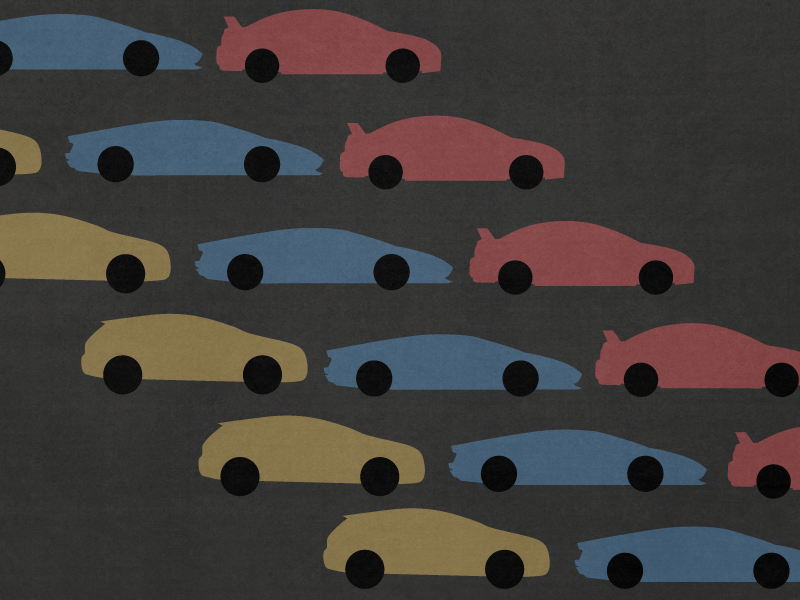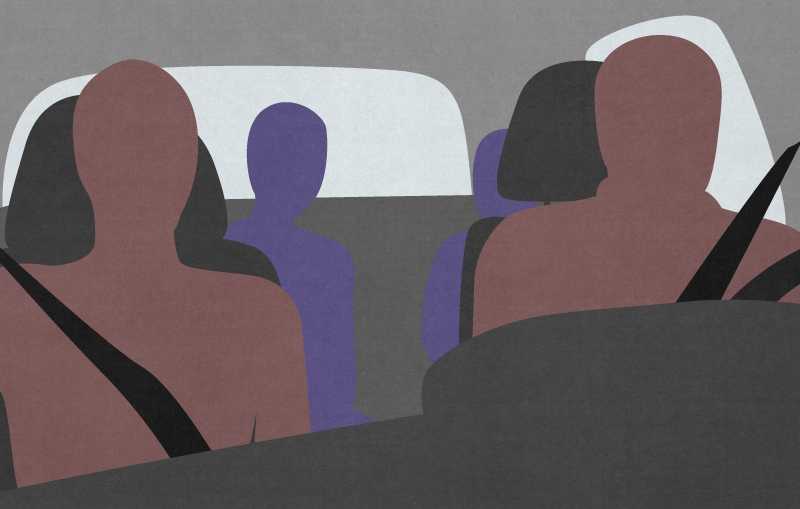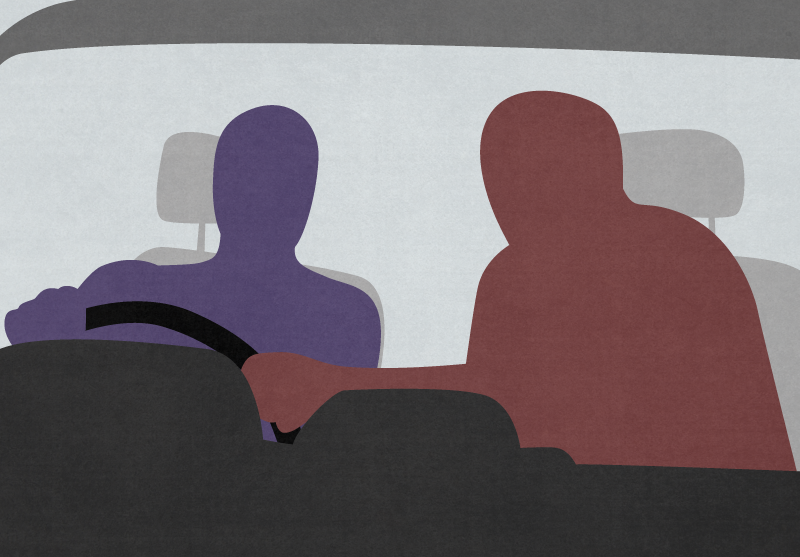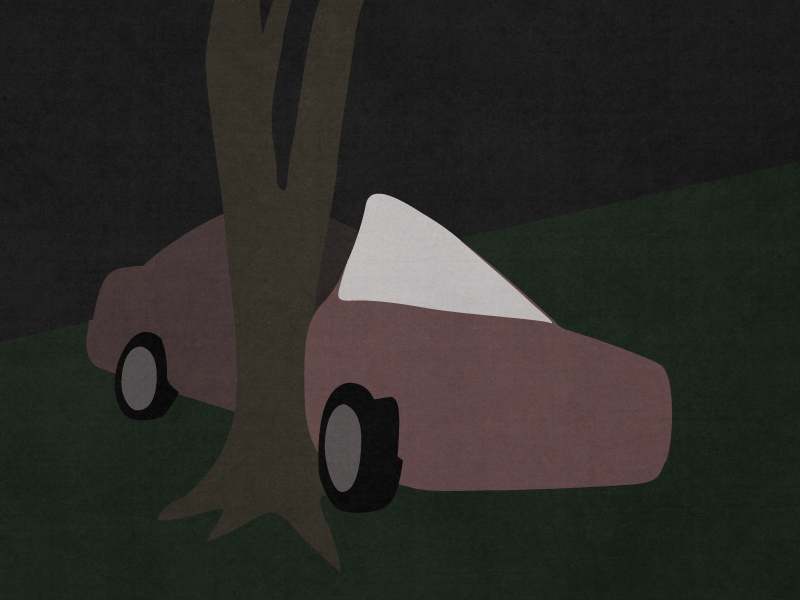Lately, I’ve been waxing romantic about traffic accidents. It has something to do with all the news about driverless cars, also known as autonomous vehicles, or AVs. Since 2015, when Tesla released its Model S, which could park on its own and drive solo on highways, car and tech companies have been hotly competing to achieve the next breakthrough. Now I hear that, by 2020, Google will release a car that has no steering wheel or pedals for accelerating and braking. This prospect sounds terrifying — until you consider that 90 percent of traffic blunders are attributed to human error. With AVs, the techies proclaim, such error will go the way of the Dodo. We are entering an era of Utopian travel, “the accident-free society.”
That phrase, which keeps popping up in my reading about AVs, makes me profoundly — if perversely — sad.
Don’t get me wrong. I know that, in the United States alone, tens of thousands of people die, and millions are injured, in car crashes each year. Truly, it would be grand if no one had to suffer this way ever again. But I also know that, in order to gain something in this life, we must give something away. Every technological shift has come with a cultural one. While it may be more than a fair trade, we will certainly lose some part of ourselves, of our old way of being, to the AV era. I wonder: What is it that we’ll lose?
•
If there is anything that encapsulates what it means to grow up in the United States, it is the car. Henry Ford is as much a part of our national mythos as George Washington, among those icons whose troubling qualities we tend to ignore; we recall Washington as a Revolutionary War hero, not a slave owner or Native-American killer, and Ford as an industrialist, not an anti-Semite. As troubling as our reverence for the man who popularized cars is our affection for the machines themselves: It’s no secret that personal vehicles account for a huge portion — a full 1/5 — of the nation’s total greenhouse-gas emissions, of which the United States contributes more than double the global average per person. And yet, nearly 90 percent of U.S. households report owning at least one car, the second highest rate in the world (just one percent shy of Italy’s).
For better or worse, cars travel with us and communicate — or miscommunicate — information about who we are and how we transform over the course of our lives. They’ve become extensions of our bodies, our primary markers. Our bodies advertise us as members of a particular sex and contribute to assumptions about our gender, which can be inaccurate or limiting. Our skin color and facial features contribute to perceptions of that other social construct, our race, labeling us Asian, Black, Caucasian, Latinx, or “Other.” But what about that third point of the identity triangle, class? Our cars offer one of the strongest barometers.
The first questions are: Did your family have a reliable car, or cars, when you were a kid? Do you have one now? In all but a few U.S. cities with robust public transportation, cars determine how easily you move through the world: Where can you conveniently work, shop, seek medical care? These activities have a profound effect on the trajectory of our lives, our social mobility or lack thereof. If you do have a car, what kind do you have? A van, a sports car? Do you own it, or do you lease it? What went into your choice of car? Did you pick whichever offered the most bang for your buck? Or were you more interested in aesthetics? In technological bells and whistles?
What I’m getting at is the idea that cars can serve as mirrors, for ourselves and our experiences of the world. I understand that what I see in cars you might not see.
•
My parents had two cars when I was growing up. The first I remember were a brown Audi, bought very used — my mother complains it often broke down, though I don’t recall that — and a red Volvo station wagon, leased new and ultimately purchased. I remember the wagon more clearly, as it was the one we used for childhood road trips to the Jersey Shore or my grandparents’ trailer in upstate New York. I remember sitting in the backseat with my younger sister, playing with McDonald’s Happy Meal toys. When I felt tired I’d pull down the center armrest and lay my head on it, which my sister would then want to do, too. We’d bicker until our parents admonished us from the front seat; if we didn’t stop, they’d reach backward to slap our knees, letting us know they were serious. Returning home at night, I’d marvel at the moon that stayed in the window no matter how fast we drove. I remember falling asleep watching it, surprised it was still there when I awoke in our driveway.
So these earliest car memories are of passive well-being, a sense that my mother and father were in complete control. They knew where we needed to go, and they would deliver us there. This feeling continued as I grew older and began to attend school and participate in activities such as dance, swim lessons, Girl Scouts, and softball. Soon my friends’ parents joined my chauffeur service. The carpool mini-vans, station wagons, and sedans would arrive magically at my doorstep to take me here, there, and everywhere in Hackensack, New Jersey, and beyond. In my early teens, my child’s world expanded to the malls and movie theaters of nearby towns and, sometimes, even the stages of New York City. One of the most exciting moments of my adolescence was the night I went with friends to see Ben Folds Five, one of my first concerts without parents. Though we were far from alone. Two of my friends’ mothers picked us up in a minivan from the city, not wanting us to take the bus home so late at night. After the show, I remember glimpsing one of their panic-stricken faces on the corner outside the venue, scanning the crowd for our scrawny bodies.
Around this time we came to view our parents’ cars, being shuttled around in them, as an embarrassment (not the privilege it actually was). We wanted to be dropped off away from school in the mornings, lest anyone catch us in these uncool vehicles. We’d walk home in the afternoons, long glorious strolls punctuated by stops at the deli for snacks and a hangout on patch of grass with a bench we called “The Island,” which was a kind of center point from which each of our homes radiated out.
At the end of my freshman year of high school, I thought I’d hit the jackpot by finding a boyfriend, Mickey, whose older brother had his own car, a hand-me-down coupe in which I was thrilled to be picked up weekday mornings. I felt like like the lead in a John Hughes movie, some ersatz Molly Ringwald, arriving at the school parking lot in the company of these two cute guys. Mickey’s brother also sometimes let us tag along with him to parties on the weekends with his girlfriend, who played the role of designated driver. I remember how exhilarating it felt to sit in the backseat, buzzed after my first keg party, considering all the future had to offer — beginning with the acquisition of my own driver’s license.
•
“For decades, Americans have been in love with the automobile — or so the saying goes. This single idea has been a central premise of transportation policy, pop culture and national history for the last half-century,” Emily Badger wrote in a Washington Post column, “The myth of the American love affair with cars.”
The love I see in cars isn’t romantic. It’s parental. The automobile as womb. A small warm place in which we begin utterly vulnerable to our parents, whom we must trust to guide us. As we grow, we resist that guidance, seek to know the world on our own. We metamorphosize from child to adult, from passenger to driver. I suppose this is the logic of The Game of Life, a board game I played endlessly growing up with my friend Beth. In it, each player gets a tiny plastic car and a single plastic stick-figure driver. The goal of the game is to win by accumulating the most assets, which shift according to whatever circumstances befall the player as a result of where she lands on the board: college, marriage, birth of children, divorce.
I wonder, in the AV era, what will it mean to have never measured one’s growth, one’s maturation in relation one’s position within the automobile? To have never been driven by a caretaker? To never have developed that particular sort of trust? To have always been driven by a robot? To have never needed to, and therefore never wanted to, learn to drive? To have never felt the existential dread that comes from being a small body suddenly made larger, more dangerous, by the addition of a powerful machine? To have to navigate among all the other small bodies and their powerful machines?
•
Despite my early fantasies of the open road, when I actually sat behind the wheel, my excitement turned to fear. This was due in no small part to the driver’s education course I was required to take at my high school, in which we learned the awful fates that await careless drivers. On the TV bolted to the concrete classroom wall, we watched teenagers and their parents weep over decisions to drive drunk or high, not wear safety belts, run red lights, disobey speed limits. In each case, the consequence was extreme injury or death.
My parents’ agitation during the time I had my learner’s permit did not help build my confidence either. Whoever sat beside me in the car would inevitably freak out at my slightest error: stopping too short at a light, driving too close to the car in front of me, not turning far enough to check my blind spot. My father, who has a notorious temper, more than once forced me to pull over and return to the passenger seat, proclaiming my driving would “kill us all.”
I was so nervous the day I took the road test for my license, I made a left turn into the wrong lane on the faux streetscape that had been constructed behind the Department of Motor Vehicles. Despite this, the examiner awarded me a driver’s license, perhaps due to my prize-winning performance of white innocence: I had all but cried in my apology; “I totally get that the turn was wrong,” I’d said. My parents also agreed to lend me the older of their two Mazda sedans — the Audi and Volvo were gone by then — when I wanted to borrow it, assuming they didn’t need it at the time. I much preferred to be a passenger in my friends’ cars, however, and I rarely asked for the Mazda.
One of the few times I did serve as designated driver, I got into an accident. I had borrowed the car to drive my girlfriends around town rather aimlessly; three girls were in the backseat, one was up front. We were cruising along Passaic Street, one of the main drags in town that led to our frequent stop, 7-11, when I signaled to change into the righthand lane. The car beside me, however, was moving faster than I thought, and I wound up sideswiping it. We pulled into a parking lot to assess the damage. It turned out that the other driver and passenger were students at my high school. They were stoned, had been smoking blunts. As a fellow occasional toker myself, I understood the sensitivity of the situation. None of us wanted the trouble of reporting the event to the cops. No one was hurt, and my car was the only one with a dent, a ding on the passenger side. So we shook hands over an oath of silence and went our separate ways.
When I returned home that night, I pulled into our driveway with the dent facing away from our house. I knew my parents wouldn’t use the car again until Monday, and the following day was Saturday. All weekend I tried to work up the courage to tell them what had happened. At the time, relations between us were fraught, and I feared their wrath when they learned about the accident. Finally, when Sunday rolled around, I went down to the basement where my mother was watching television. My father was out of the house, probably knocking back a beer at the American Legion around the corner. I crept down the steps and approached her.
“Mom?”
“Mmmm?”
“I need to talk to you about something.” She looked at me and put the television on mute.
“I’m afraid to tell you.” At this, the color drained from her face. She bolted upright from her lounging position and splayed her palms on the coffee table.
“Jennifer, what is it? Tell me right now.” When I unfolded the story, my mother exhaled. “Oh, Jesus. I thought you were going to say you were pregnant..”
“What? No! Of course I’m not pregnant!”
To my surprise, my father was equally unperturbed by the accident. “Shit happens” was the gist of his response. I guess they were just relieved that their larger fear, my pregnancy, had not yet been realized.
•
“In order for a child to understand something, he must construct it himself, he must re-invent it,” said the developmental child psychologist Jean Piaget in an oft-quoted 1972 symposium. In other words, we learn by doing. If you touch a hot stove and burn yourself, you know not to touch a hot stove again.
At the most basic level, I learned to operate an automobile. My fender bender taught me even more than my successes on the road did, specifically how carefully I should look before changing lanes. The accident also functioned to “re-invent” for me something which I’d come to doubt: my parents’ love for me. Things had gotten so tense in my household leading up to the accident — due to my propensity to “talk back” and bitterness about a number of circumstances I won’t get into here — that I was certain my father would beat me, and that my mother would let him, when they found out. When they reacted not with violence or even anger, I was reminded that beneath the vicissitudes of our relationship lay the foundation of their concern for my life. They were simply glad I was alive— and, also, without child. My future remained bright.
I got another reminder of my parents’ love for me when I got into a second, much worse, accident a few years later. This occurred during my junior year of college. I’d gone out of state to study journalism at the University of Maryland, just outside Washington, D.C.. By my junior year I was living in a house with friends, which was cheaper than living on campus. I’d procured an internship writing and editing at a small newspaper aimed at the diplomatic corps in Washington. Not having a car meant I had to take a long walk to a bus stop — part of which was along a busy throughway — and take the bus from there to the office. Returning home in the evening made the trek especially daunting.
Worried about my safety and time for my studies, my parents made the decision to give me one of their cars and continue paying for the insurance. I knew that this would make life more difficult for them. Having to share one car when they both worked full time and had my sister still living with them would mean some schedule rearranging and sacrifice. But they couldn’t afford a third car, and they wanted to give me what they could.
My quality of life improved greatly with the addition of the car, and I relished cruising in it on and around campus. One gorgeous fall afternoon, I popped in a cassette tape — the Rolling Stones album Flowers — and began driving up the winding, wooded road near my house toward my internship. The windows were down, letting in the crisp air. The song “Mother’s Little Helper” played as I rounded a curve, admiring the reds and yellows of the surrounding leaves.
Suddenly, I felt the car slip and veer out of my control. The vehicle spun, crossing the miraculously empty lanes in a 360-degree turn that ended only when it collided with a tree on the opposite side of the road. The car came to a thunderous halt, windows shattering. I sat inside, dazed, for a few seconds, unsure of how to proceed. I couldn’t open my door — the tree embedded in my side of the car prevented it — so I crawled out the window, managing to not so much as cut myself on the broken glass in the process.
I stood staring at the wreckage. The car had seemed so solid. That this hulking machine was now wrapped halfway around a tree trunk was difficult to comprehend. While the car was not something I could bend out of shape with my own small hands, I saw clearly now that the world contained forces strong enough to demolish it easily. Speed combined with mass combined with . . . what? Fate? Divine intervention? Or dumb luck? I thought back to those scare-tactic videos in high school, in which the crash always stemmed from an identifiable error. The driver had been drunk. The driver had ignored speed limits. The driver did this to herself. What had I done? Taken a turn too fast? Maybe. Or maybe tragedy can strike at any moment, for no reason at all. Maybe the universe was chaos.
I turned to walk back to my house, less than a quarter of a mile away. I knew I had to call my parents, the thought of which sickened me. Sure I’d survived the crash, but my parents would surely kill me for ruining the gift they’d just given me.
Once again, however, they shocked me with their utter lack of concern for the car. They only wanted to know I was safe, strangely unscathed. Yes, they wanted answers about how the accident had transpired. But when it was clear I hadn’t been drunk or high or even distracted by other passengers, they simply shrugged their shoulders and helped me deal with the aftermath. A mechanic I’d called to the scene informed me the car was nearly totalled and, at roughly a decade old, it wasn’t worth much. On my parents’ advice, I donated it to a veteran’s charity that agreed to tow it in exchange for whatever money might come from selling it for scrap.
I went another few months without a car. At that point my grandparents stepped in and purchased for me a 1986 Subaru station wagon that belonged to the superintendent of their apartment building. Though the car was nearly two decades old, it was in excellent condition, as the previous owner had hardly driven the thing. That Subaru ferried me safely through the next five years of my life, including a second internship at a “real” newspaper, The Baltimore Sun, and into my first full-time job as a newspaper reporter at a smaller Baltimore paper called The Daily Record. I kept the wagon until I could afford to buy a newer car, a mildly used Toyota Corolla, which I drive to this day.
•
Sometimes I think about that accident, aware the slightest change to any number of variables that day might have sent my car into that tree at a fatal angle, crushing my torso or sending a shard of glass through my jugular vein. But here I am more than a decade later, of sound mind and body. So much has happened since then. I graduated from college, started and ended a career in journalism. I moved to New Orleans and, after a few raucous years there, moved to New York. Then back to New Jersey, where I now reside. I entered graduate school, earned my MFA, began a career as an educator. I published my poetry. I got married. In a few weeks, I’ll begin a PhD program to continue my career in higher education, to deepen my writing practice. Narratives upon narratives worth of living.
As I contemplate the arrival of the AV era, maybe it’s a narrative that I’m preemptively mourning. The one rooted in the life of danger we still lead. It’s usually napping just beneath the surface of every day, but once in awhile danger awakens, hungry. The near-death experience seems valuable somehow. But maybe that’s only because we have lived to tell about it. As technology marches forward, it’s likely that our lives will become safer and safer, will last longer and longer. Is that such a terrible thing? I’m not unhappy about the fact that I live in an age free of, say, Polio, Smallpox, and the other diseases that once made life far more precarious, even if it does limit the kind of stories I can tell. I’m sure that the future’s AV drivers — or whatever word we come up with to describe them — will not pine for a bygone era of vehicular peril.
But what circumstances, what bits of their personhood will strike them, scare them, drive them? What stories will they tell? Maybe that’s what makes me sad— that whatever their narratives, they won’t be mine. I’ll be long gone by then, my body and mind not anywhere I can name. •
All images created by Shannon Sands.








